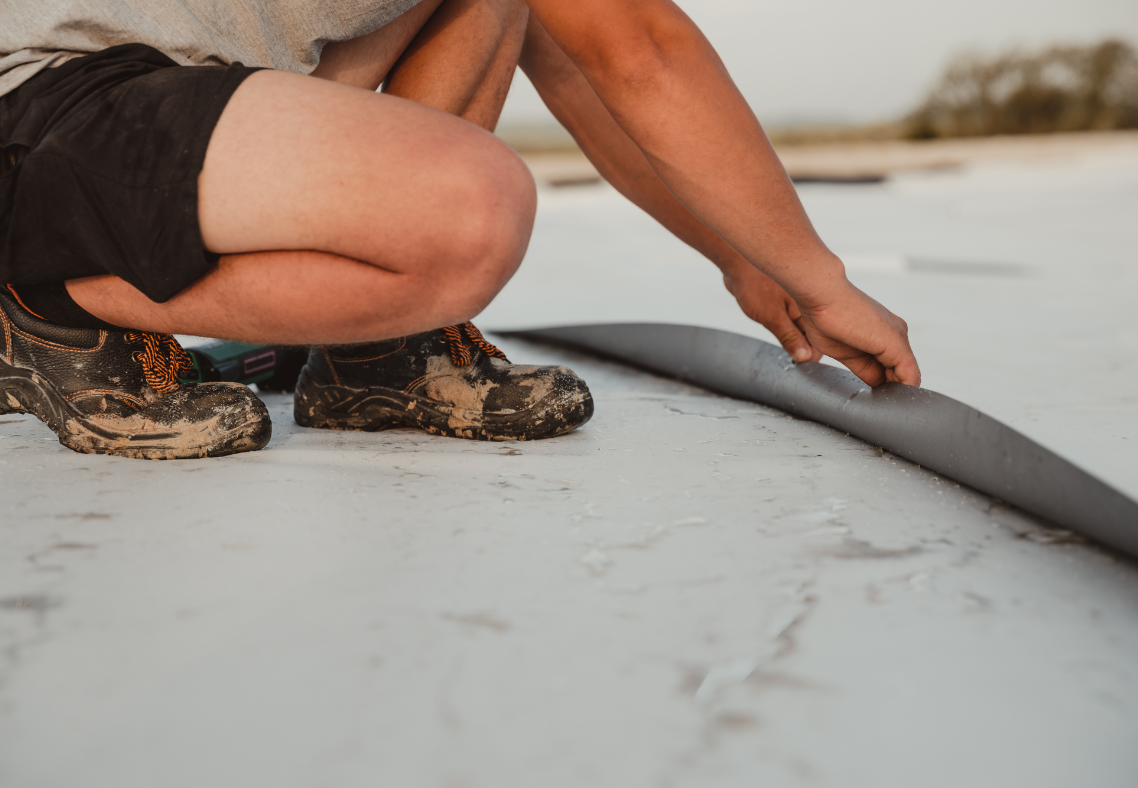What Is PVC Roofing Membrane?
Roof Right: Exterior Home Remodeling Specialists in Maryland Contact UsSchedule A Free EstimateWhen it comes to flat or low-slope roofing, PVC (polyvinyl chloride) roofing membrane is one of the most popular and effective choices for both residential and commercial properties. Known for its durability, energy efficiency, and waterproofing capabilities, PVC roofing provides excellent protection and performance for flat roofs, which are commonly used for living spaces, garages, and even covered patios. The membrane’s reflective qualities make it ideal for warm climates, as it reflects rather than absorbs heat, keeping interior spaces cooler. Let’s dive deeper into what makes PVC roofing a great choice, the factors affecting its longevity, and how it stacks up against other flat roofing materials.
Answering The Question: What Is PVC Roofing Membrane?
What is a PVC Roofing Membrane?
A PVC roofing membrane is a single-ply white material designed specifically for flat or low-slope roofs. It’s created with multiple layers of polyvinyl chloride (PVC) and reinforced with polyester to enhance its strength and flexibility. The white color of PVC roofing membranes has an additional benefit—it reflects sunlight rather than absorbing it, which helps regulate indoor temperatures and improves energy efficiency. Due to its durable design, PVC is resistant to tears, punctures, and chemicals, making it particularly useful in areas exposed to high winds, chemical exposure, or varying weather conditions, like Maryland. The membrane is typically adhered to the roof deck with glue or mechanical fasteners, and its seams are heat-welded for extra durability.
Why Choose PVC Roofing?
PVC roofing is a great choice for any roof with a low slope or flat design. Traditional roofing materials like asphalt shingles are ill-suited for these types of roofs, as they rely on gravity to shed water effectively. However, PVC roofing is fully waterproof and prevents water pooling, which is essential to avoid leaks or water damage. If your roof has a pitch below 2:12, PVC roofing or another flat roofing option is recommended to keep your roof properly waterproofed and your home protected from Maryland’s rain and humidity.
How Long Does a PVC Roofing Membrane Last?
The lifespan of a roof is crucial to understanding its long-term value. When installed correctly, a PVC roofing membrane can last around 25 years or even longer, depending on the quality of installation, weather conditions, and maintenance.
Factors Affecting Longevity
While the typical lifespan of PVC roofing is 25 years, other factors can impact how long it lasts, including:
- Installation Quality: Proper installation ensures a PVC membrane performs as expected. Poor installation, on the other hand, can result in premature wear and the need for frequent repairs.
- Sun Exposure: Constant, direct sunlight can affect the roof’s durability over time, though PVC membranes are UV resistant and reflect much of the sun’s rays.
- Weather Conditions: PVC performs well against rain and humidity, making it suitable for Maryland’s climate. However, extreme storms can still cause some wear and tear.
With periodic maintenance and inspections, you can help your PVC roofing membrane reach its full lifespan while keeping it in good condition.
Cost of PVC Roofing Membranes
Cost is often one of the most important factors homeowners consider when choosing roofing materials. The price of a PVC roofing membrane can vary based on several factors, such as the size of the roof, insulation, and labor costs. On average, expect to budget between $14.00 to $17.00 per square foot for smaller PVC roofing projects. For larger roofs, the cost per square foot may decrease slightly, around $12.00 or more. It’s worth noting that the type of insulation used under the membrane can also impact costs. Heavier or more effective insulation will increase expenses, while basic fabric insulation glued to the membrane is a more budget-friendly option.
Pros and Cons of PVC Roofing
Pros
- Energy Efficiency: PVC roofing reflects heat, which can significantly reduce cooling costs in warm weather. This is particularly beneficial for properties in Maryland with large flat roof areas, as it helps maintain comfortable indoor temperatures.
- Durability: PVC roofing is highly resistant to punctures, chemicals, and fire, making it one of the most durable flat roofing materials available. Its heat-welded seams make it less susceptible to leaks and damage.
- Low Maintenance: With its durable construction, PVC requires little maintenance compared to other roofing materials. Cleaning it occasionally to remove dirt is usually sufficient to keep it looking good.
- Sustainability: PVC is eco-friendly as it can be recycled, making it a sustainable option for homeowners who prioritize environmental impact.
Cons
- Cost: PVC roofing can be more expensive than alternatives like TPO or modified bitumen. While it offers long-term value, the initial cost may be higher, especially for smaller projects.
- Aesthetic Maintenance: The white membrane of PVC roofing can become discolored over time, which is purely cosmetic and does not affect performance. However, it’s something to consider if the roof is visible from your home’s windows.
- Specialized Installation: Not all contractors have experience working with PVC membranes, so it’s essential to hire professionals familiar with PVC installation to ensure a secure and efficient installation.
Is PVC Roofing Right for You?
When considering whether a PVC roofing membrane is the best choice for your flat roof, it’s essential to weigh its benefits against any potential drawbacks and compare it to other roofing materials like TPO, EPDM, or modified bitumen. Here’s a quick comparison:
- TPO: TPO (thermoplastic polyolefin) is similar to PVC in energy efficiency and reflectivity. However, it may not be as durable as PVC.
- EPDM: EPDM is a durable rubber material with a black finish, which may be less energy-efficient than PVC but is more budget-friendly.
- Modified Bitumen: This asphalt-based material is affordable and easier to install, though it has a shorter lifespan and is less reflective than PVC.
For homes in Maryland with low-slope or flat roofs, PVC roofing is often the preferred choice due to its energy efficiency, durability, and waterproofing capabilities. However, if you’re looking for a different aesthetic or have budget constraints, exploring TPO, EPDM, or modified bitumen may provide suitable alternatives.
Contact Roof Right For PVC Roofing Membrane Installations In Maryland
If you’re considering PVC roofing for your home or commercial property in Maryland, Roof Right is here to help. Our team of experienced roofing professionals in Hampstead, MD, understands the unique demands of flat roof installations and can guide you through the entire process, from material selection to expert installation. Contact Roof Right today to schedule a consultation and learn more about the benefits of PVC roofing for your property. Let us help you choose the best roofing solution to protect your investment and enhance the value of your home. Call us or visit our website to get started with Maryland’s trusted roofing professionals!
Areas We Serve
If you're looking for a roof contractor in Maryland, give Roof Right a call today at (410)-374-5923 to schedule an appointment!
Carroll County
Howard County
Clarksville, Columbia, Elkridge, Ellicott City, Fulton, Jessup, Laurel, Woodstock
Montgomery County
Baltimore County
Baldwin, Bradshaw, Carney, Cockeysville, Glen Arm, Hunt Valley, Jacksonville, Kingsville, Lutherville, Nottingham, Overlea, Owings Mills, Parkton, Parkville, Perry Hall, Phoenix, Pikesville, Reisterstown, Sparks, Timonium, Towson, White Marsh

